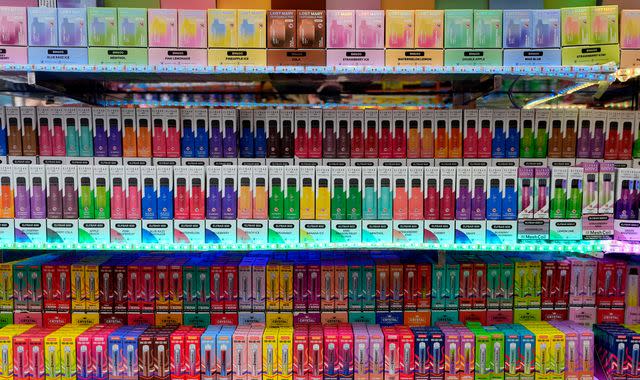Why are disposable vapes bad for the environment?

Pro-vaping lobbyists are fighting back against UK plans to ban vaping, warning black market sales would surge. But even they say the waste problem is "undeniable". Can it be avoided?
What are disposable vapes?
E-cigarettes, also called vapes, work by heating a solution including water, flavouring and nicotine to create a vapour that the user inhales.
Disposable vape pens come ready-filled with around 600 "puffs" of e-liquid and nicotine, and cannot be recharged.
Brits throw away 1.3 million disposable vapes in a single week, according to non-profit Material Focus.
Read more:
Disposable vapes to be banned over concerns of sharp increase in children's use
Five children fall ill after smoking 'unknown substance' in vape at Graeme High School in Falkirk
Spending watchdog casts doubt on controversial fossil fuel alternative
Disposable vapes are hard to recycle
Anna Diski, plastics campaigner at Greenpeace UK, called vapes a "clear environmental menace" because they are "near impossible to recycle".
It is hard to separate the lithium battery from the plastic and other parts that make up a vape.
Ms Diski said: "They're one of the new defining images of single-use, throwaway culture, often ending up as waste that litters our streets, parks, and our beaches."
A 2022 study published in the peer-reviewed Lancet journal warned of the "rising environmental threat" of vapes.
As with cigarette butts, disposable e-cigarettes tend to be "thrown away carelessly" rather than disposed of in dedicated facilities like smartphones are, the study said.
As they degrade, they leach plastic, "toxic compounds" and nicotine into the environment.
Vapes cause fires
While litter is a problem, vapes shouldn't be thrown in the bin either, experts say, because they can start fires.
The Local Government Association (LGA), which supports a ban, says single-use vapes are "a hazard for waste and litter collection and cause fires in bin lorries". The Lancet study also warned of the fire risk.
That's because the lithium batteries inside the plastic "can sharply increase in temperature if crushed and can become flammable", according to the LGA.
Click to subscribe to ClimateCast wherever you get your podcasts
Vapes contain minerals needed to make the country more eco-friendly
Vapes are made using plastic and critical minerals that are in demand for green technologies that will help tackle climate change.
Each single-use vape contains on average 0.15g of lithium.
With more than a million thrown away every week, this adds up to 10 tonnes of lithium a year, equivalent to the lithium in batteries inside 1,200 electric vehicles, according to Material Focus.
They also contain copper, which is "vital for a lot of infrastructure" such as rail and EV charging, said Libby Peake from thinktank Green Alliance.
Over the next two decades, demand for lithium is expected to grow 40 times higher than it was in 2020, according to the International Energy Agency. The price of lithium carbonate is rising, jumping 150% in one year in 2021.
Ms Peake said: "The world will soon need every ounce of lithium it can get its hands on and disposable vapes, which are hardly ever recycled, are a waste of this valuable resource.
"We are throwing what industry insiders often term "white gold" down the drain."
Suggestions made to reduce damage from vape waste
"Fortunately, vape waste is a preventable environmental disaster," the authors of the Lancet study wrote.
They recommended that flavours other than tobacco and menthol should be banned. Vaping advocates call this "misguided", as the flavours and convenience help people switch from cigarette smoking.
The LGA said the design of vapes makes them "inherently unsustainable", so a ban would be more effective than recycling at limiting the environmental damage.
Lobby group the World Vapers' Alliance says the "waste generated by disposable vapes is undeniable", but better regulation and innovation would solve the problem better than a ban.
Michael Landl, director of the World Vapers' Alliance, said: "The black market won't solve this issue, but legal and innovative businesses and consumers will."
He said legal restrictions on the size of tanks and nicotine strength meant more waste because a user would have to buy more vapes for the same effect.
Increasing these sizes would reduce the proportionate amount of material involved, Mr Landl said, though other campaigners warn this could make vapes more addictive.


